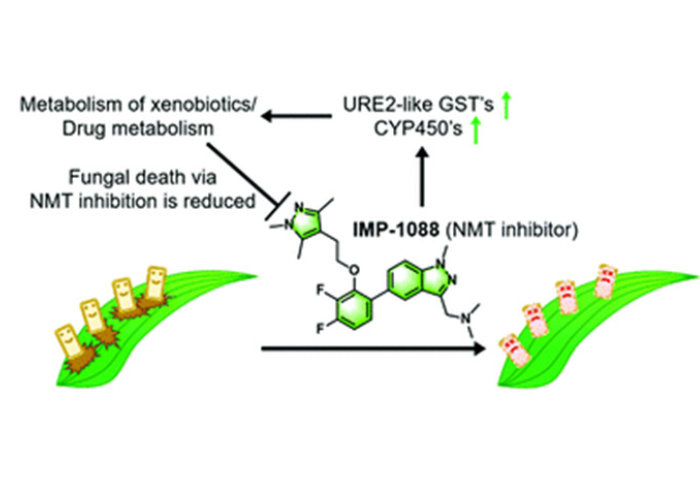N-myristoyltransferase inhibitors against wheat pathogen Zymoseptoria tritici

N-myristoyltransferase inhibitors display on-target antifungal activity and reveal an unusual metabolic defence mechanism
Congratulations to Tate group alumnus Dr Roman Fedoryshchak and member Dr Cory (Tony) Ocasio on their recent publication to RSC Chemical Biology in collaboration with Syngenta AG.
Zymoseptoria tritici (Z. tritici) is the causative agent of Septoria tritici blotch, which costs billions of dollars annually to major wheat-producing countries in terms of both fungicide use and crop loss. Owing to antifungal resistance,current commercial fungicides are in danger of becoming ineffective against the agricultural pathogenic fungi. New approaches and insights have therefore been needed to increase the rate of discovery and development of new fungicides.
The newly published research targeted Z. tritici via inhibition of the N-myristoyltransferase (NMT) enzyme. NMT inhibition is known to be effective in several pathogenic organisms and is an ongoing focus of interest for the Tate group. NMT enzymes function by transferring fatty acid chains onto protein targets in the cell. Z. tritici NMT was characterized biochemically for the first time and the Z. tritici myristoylated proteome was profiled. Against this background of knowledge, the first inhibitors against Z. tritici NMT were identified and validated.
Proteomic investigation of the downstream effects of NMT inhibition identified an unusual and novel mechanism of defence against chemical toxicity in Z. tritici. Application of the inhibitor caused an upregulation of a metabolic enzyme in Z. tritici, but this was unlikely to be caused directly by NMT activity and further research will be required to clarify this. Research into novel fungicidal modes-of-action is essential to satisfy an urgent unmet need for novel fungicide targets. This study hopes to serve as a useful resource, encompassing proteomics and bioinformatics, for researchers studying Z. tritici.
The project was funded from the European Union's Seventh Framework Programme for research, technological development, and demonstration. This research was also supported by the Crick Institute via Cancer Research UK, the UK Medical Research Council, and Wellcome Trust.
Article text (excluding photos or graphics) © Imperial College London.
Photos and graphics subject to third party copyright used with permission or © Imperial College London.
Reporter
Dr Ravi Singh
Department of Chemistry
Edward Bartlett
Department of Chemistry